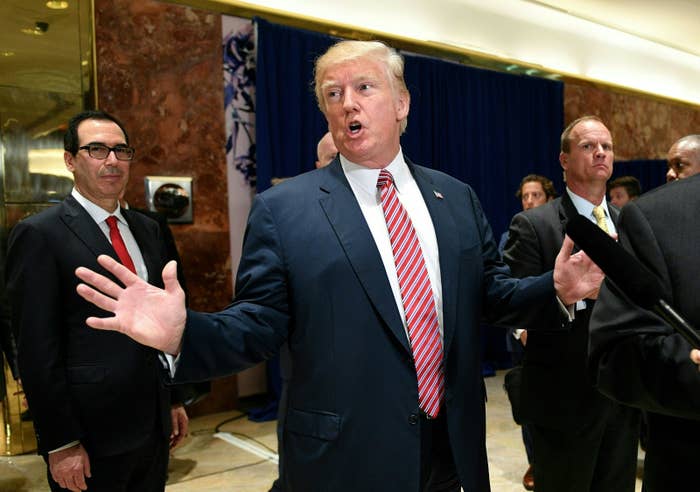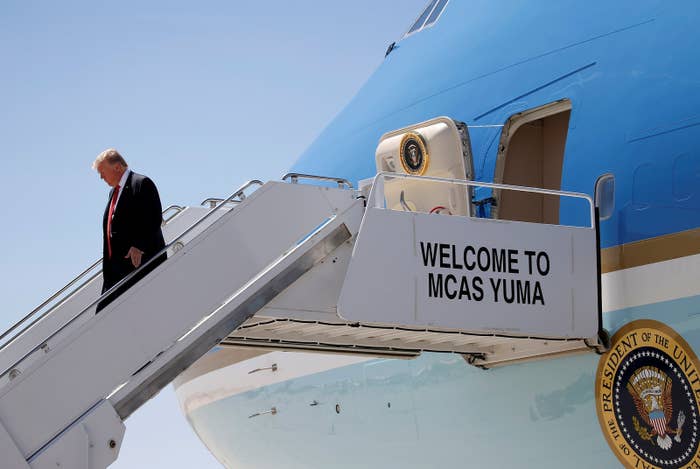
President Trump’s handling of matters of race and penchant for equivocation on the subject of white supremacists is roiling tensions between black Republicans and members of the Trump administration.
Since the president first commented on the white supremacist rally in Charlottesville, and the violence that followed, black Republicans have said publicly and privately that Trump has compromised his authority on race. In one case, a black operative outside the White House has argued with a black official inside the Trump administration, according to messages obtained by BuzzFeed News. Three sources, meanwhile, told BuzzFeed News that staffers have considered leaving the administration over the situation, but haven’t — for various reasons — followed through.
“When the moral fiber of a nation is at stake, the people cannot rely on a morally bankrupt leader to guide them out of darkness into light,” Shermichael Singleton, a former top aide to Ben Carson who was dismissed from the administration after he was found to have criticized Trump during the campaign, said, referencing an opinion piece he later published. “I think black Republicans should support the leader of our party, but in times when the president isn’t doing a great job we must take him to task, that is our obligation.”
Over the course of the last 10 days, Trump first issued a statement on the day of the violence in Charlottesville, condemning the actions of “many sides” at the rally — which was intended as a gathering of white supremacists, neo-Nazis, members of the alt-right, and others, and which drew a wide range of counterprotesters, from faith leaders and local residents to so-called "antifa." One man who marched with a white supremacist group killed a woman after ramming a car into other cars amid a crowd of protesters. BuzzFeed News reported on the ground from the event, where white supremacists came prepared for violence and disobeyed police orders. Days later, the president said, “You had people that were very fine people on both sides” — of a Friday night march that featured white men chanting things like “Jews will not replace us” while carrying tiki torches.
And on Tuesday of this week, Trump yet again attacked the media’s coverage of his remarks on the subject, at one point leaving out the “many sides” portion of his original remarks, and at another pretending to be the media: “Why did it take a day? He must be a racist! It took a day.”
His response hasn’t been satisfactory to many conservatives, especially those who are black. The black conservative movement’s unquestioned nonelected leader, J.C. Watts, a former Oklahoma congressman, electrified young black conservatives outraged by Trump in a pair of recent television appearance. Watts — in clear, no-nonsense terms — argued that silence from leaders on the issue amounts to agreeing with the Ku Klux Klan, and that he disagreed with how the president responded. One of the president’s favorite television shows, Fox & Friends, recently featured a segment in which multiple people criticized his response. “Last night, I couldn’t sleep at all because President Trump — our president — is literally betrayed the conscience of our country,” said an emotional Gianno Caldwell, a black Republican commentator.
Black Republicans have long scoffed at stereotypical characterizations casting them as Uncle Toms or as sellouts to their race, leaving them in a difficult position politically to begin with — something exacerbated by the last 10 days. Plenty of black Republicans once saw Trump’s inexperience as a path to fixing Washington: They imagined being able to advance long-championed conservative solutions to an executive who needed them. But that mostly Bush-era group of risk-averse activists and operatives — loath to publicly critique a president or aide — is baffled by the president’s behavior. And it doesn’t want any black Republicans defending it.
Prominent black Republicans like Watts, former RNC chair Michael Steele, strategist Elroy Sailor, and former Bush administration official Kay Coles James have been engaged in discussions related to Trump and Charlottesville over the course of the last week, two GOP sources said. Some have been involved in talks with congressional leaders on how to set policies and speak to the issues that created the environment in Charlottesville. A senior black Republican official declined to characterize the nature of the talks, saying only they were “strategic” and conducted with “a myriad” of Republicans “on the Hill and off.”
What emerged in interviews with nearly a dozen black Republicans was a keen sense of the division between these Republicans and a more pro-Trump wing. Within that ostensible Washington establishment, few were aligned with Trump during the campaign. Many are dismayed that someone close to Trump hasn’t been able to effectively tell him how what he’s doing is detrimental and offensive to black Americans. These sources often mean, specifically, Omarosa Manigault-Newman, the highest-ranking black White House staffer and a particular source of consternation among Washington's black Republicans, who largely feel she is not sensitive to their interests. One, Donald Scoggins, himself a party activist and longtime observer of Washington’s black Republican political class, described the White House adviser as having “sycophants, not party activists” around her. “She’s not seen as a committed Republican and perhaps even desires destroying us.” Manigault-Newman, another noted, was ready for Hillary in 2014 while black Republicans were strategizing at a Virginia retreat to elect a Republican president.
Leah Wright Rigueur, the Harvard historian who wrote the seminal work on the history of black Republicans in American politics, The Loneliness of the Black Republican, said tensions among black Republicans when the president is a divisive figure or takes a “hostile approach to civil rights and racial issues” are nothing new.
“In other words, the less power and influence black Republican loyalists and outsiders have, the more explosive the fights,” she said, adding that the 1976 National Black Republican Convention witnessed “knock-down, drag-out fights” among the 350 delegates, and that the period also saw a series of lawsuits filed by black Republicans looking to seize power control of groups organizing black Republicans. “When you're being squeezed out by the party mainstream and the White House, it's not surprising that you would turn your ire toward the target most clearly accessible.”
One senior black party activist said the current climate is clear: “You are in the J.C. Watts and Michael Steele wing of the party, or the Omarosa, Diamond and Silk wing,” they said, referring to Manigault-Newman and the two black women who sometimes provide comic relief at Trump rallies and frequently defend him on cable and the internet.
Since the Charlottesville rally, which came the day after her appearance at the National Association of Black Journalists conference in New Orleans, Manigault-Newman has been mostly silent in public.
Three sources described to BuzzFeed News an atmosphere inside the administration in which some staffers, both black and white, are considering resigning — or at least not ruling it out. One source, asking to speak anonymously to describe private correspondence, said people were “waiting” for the right moment to leave the administration as they expressed a singular difficulty: Who does the work when you’re gone? “They're between a rock and a hard place,” the person who spoke in private said. In a text message to BuzzFeed News, another young strategist lamented what he feels is a lack of courage. “None of them are willing to walk away on principle. It’s unprincipled as fuck.”

Meanwhile, Trump family insider turned administration official Lynne Patton has exchanged terse words with Sean Jackson, the chairman of the Black Republican Caucus of Florida and a longtime Trump critic.
On Aug. 12, three sources confirmed, Patton addressed Jackson after he criticized the president’s statements about Saturday's “egregious display of hatred, bigotry and violence on many sides,” and also criticized Manigault-Newman. Jackson made the comments in what sources described to BuzzFeed News as a private forum for black Republicans.
“Those around POTUS could care less about the well being and interest of our communities and therein lies the problem,” Jackson said in a message obtained by BuzzFeed News. “So while we’re witnessing this nonsense of a spectacle take place, let this be a true moment of self-reflection.”
Patton declared, in a message reviewed by BuzzFeed News, that she offered to help in any way she could as the situation devolved in Charlottesville. But the exchange also turned to interpersonal issues: She described a comment, in a message also reviewed by BuzzFeed News, that Jackson made light of her own self-admitted past personal struggles. In turn, Patton referred to a cease-and-desist letter she said the Trump campaign sent Jackson, and a pitch he made to the campaign about hiring him to do black-voter outreach. (BuzzFeed News also obtained, from a Trump ally, a 2016 memo outlining a pitch for the Black Republican Caucus of Florida to do that outreach.) These were some of the reasons, Patton said, why Jackson wasn’t asked to join the campaign or administration.
Patton confirmed the messages. Jackson did not speak on the record regarding the exchange.
Patton said she felt the need to respond because of the combination of the events in Charlottesville, what she called the journalist Ed Gordon's “unprofessional” gesturing toward Manigault-Newman at a convention for black journalists, and criticism of Diamond and Silk's pro-Trump YouTube videos.
“I was saddened and infuriated, once again, to be subjected to disparaging language anything and personal attacks within an exclusive forum that was expressly created in the spirit of unity and mutual support [among] black conservatives during the Trump administration,” Patton told BuzzFeed News, adding that mistreatment has come from all corners on social media, “including from those ironically calling for peace and unity.”
“News flash,” she offered. “Hate is hate.”
An ally who spoke with BuzzFeed News suggested that she was frustrated that, after events like Charlottesville, people like Manigault-Newman, former Trump campaign national spokesperson Katrina Pierson, and even Ben Carson get thrown into a media spectacle because they’re black, but remain best-positioned to help advise the president on issues of race. This ally also said Manigault-Newman has been engaged with building a coalition of conservatives; in recent weeks, she invited a group of young black Republican staffers to the White House bowling alley for a team-building event. (According to what appears to be a photo from the event, Republicans inside and outside the administration attended.)
Against the backdrop of raw arguments and quiet considerations of those inside the administration, black Republicans’ main goals haven’t changed: encouraging black people to look at the GOP and advancing a conservative policy agenda, particularly on issues affecting urban areas and people of color. So far, Trump helps them do neither — and has only worsened the situation for them. Black Republicans hope they can provide a road map for minority engagement — there are a host of black Republican candidates weighing statewide races in 2018, and an RNC-backed two-day conference styled after the Conservative Political Action Conference is in the works — but everything is still in flux.
But what will they do about Trump? Prominent black Republicans are speaking out, but it’s unclear how much more they can take before completely turning their backs. Sen. Tim Scott, the only black Republican in the Senate, told Vice News that Trump’s moral authority is “compromised” when he equivocates on white supremacy, but offered to work with Trump when they agree.
“I want the president to do well because he’s the president of the United States,” said Singleton. “But there are moments in time where you must say ‘Mr. President, this needs to change.’ That’s regardless of political party.”
CORRECTION
Kay Coles James' name was misstated in a previous version of this post.
